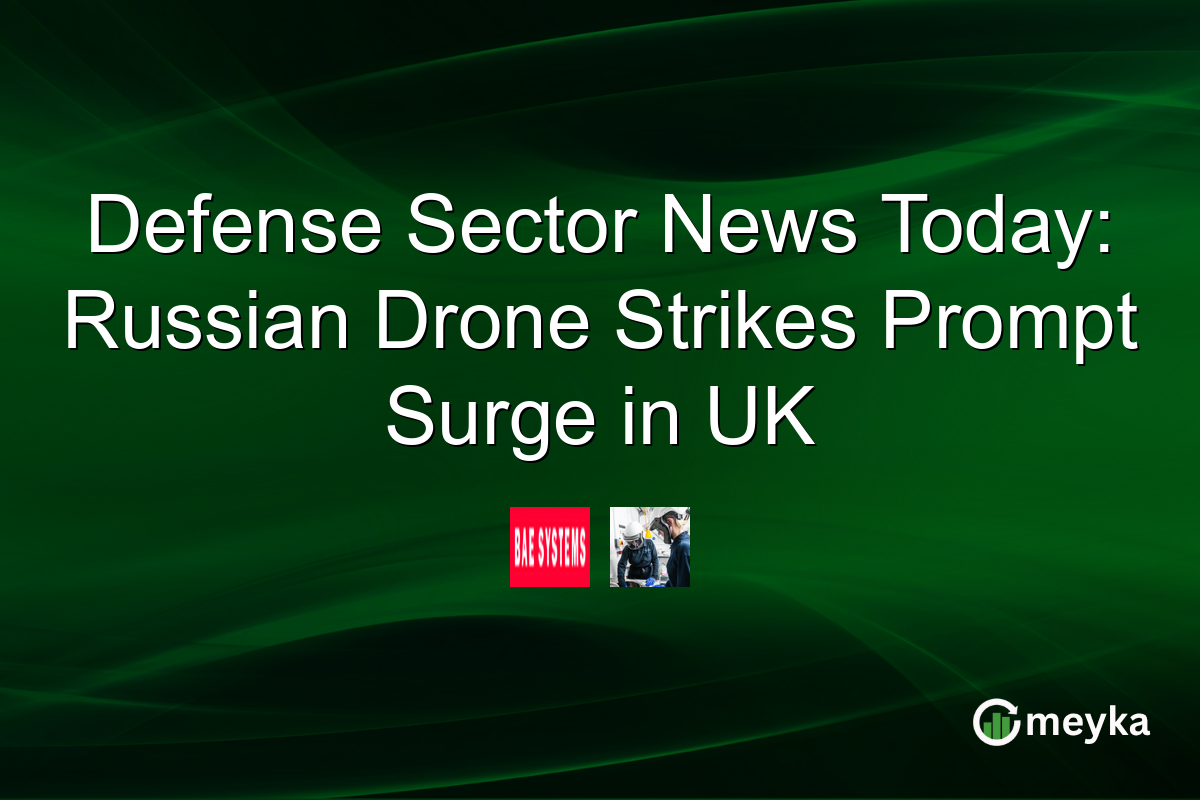Defense Sector News Today: Russian Drone Strikes Prompt Surge in UK
Recent Russian drone strikes have underscored the growing security threats that Western nations face, specifically prompting the UK to reevaluate its defense strategies. This situation has drawn renewed investor interest in UK defense sector stocks, notably impacting companies involved in aerospace and security technologies. As the global political climate shifts, this article delves into how these changes are stimulating economic activity in the defense sector and the broader implications for military spending and technological advancements.
Surging UK Defense Stocks: A Market Response
Recent developments have seen a notable increase in UK defense sector stocks, reflecting heightened market activity driven by rising geopolitical tensions. Russian drone strikes have particularly elevated investor interest in companies like BAE Systems (LON: BA.L). As of October 3, 2025, BAE Systems’ stock is trading at £2060, marking a 1.13% increase since the previous close. This uptick mirrors a broader trend, with BAE stock displaying a year-to-date growth of 40.6%. Such figures indicate strong market confidence in defense technologies and illustrate the timeliness of investments in this sector.
According to Bloomberg, the recent surge in defense stocks is not merely speculative but is backed by concrete increases in defense budgets, as nations like the UK seek to bolster their capabilities in response to evolving threats (Bloomberg Report). This illustrates the market’s tangible reaction to geopolitical developments and presents lucrative avenues for investors selectively focusing on defense sector stocks.
Military Spending Trends and Government Policy
The escalation in drone-related threats has prompted nations to reassess their defense budgets. In the UK, military spending has been a focal point, with recent policy shifts indicating significant budget allocations for advanced weaponry and cybersecurity enhancements. This reflects an understanding among policymakers that adapting to 21st-century threats requires investment in cutting-edge technologies. Military spending trends are steering towards acquiring and improving drone capabilities, both for defense and offensive purposes. The emphasis on drone technology aligns with global moves to counter threats more effectively. This trend might include reallocating funds towards more agile, technology-focused military strategies. For instance, investments in cybersecurity and electronic warfare are pivotal as new forms of warfare, like those involving drones, pose complex challenges to national security. External reference to ongoing analysis confirms that the UK is adjusting its military frameworks in response to threats, aiming to enhance its defensive postures against adversarial advances (Reuters Insight). These spending trends underline a shifting focus towards rapid adaptation and resilience within national defense strategies.
Drone Technology Investments: A Future-Facing Industry
Investments in drone technology are a pivotal component of the modern defense sector. As security threats evolve, the technological landscape in the defense sector must adapt correspondingly. This adaptation fuels investments in drone research and development, a sector witnessing significant capital influx. An increase in drone capability development offers dual advantages: enhancing national security and providing commercial applications outside the military context. This shift towards drone technology is illustrated by the surge in companies dedicated to defense innovations. Defense firms are redefining industry dynamics by leveraging advancements in surveillance capabilities, autonomy, and precision targeting. These efforts are not just reactive; they signify a strategic thrust towards anticipating future warfare and civilian uses. The focus on drone technology investments is essential not only for securing immediate operational needs but also for laying the groundwork for future technological leadership on the global front. Government and private sector collaboration in this field accelerates the innovation required to address and preempt threats, thus maintaining an edge in international defense.
Final Thoughts
The impact of Russian drone strikes has transcended beyond immediate security concerns, influencing economic and strategic aspects of the UK defense sector. With rising market activity in defense stocks like BAE Systems, and the corresponding uptick in military spending, it’s clear that these developments have initiated a reevaluation of national defense priorities. Investors and policymakers must continue to adapt to evolving threats, focusing on technological advancements and strategic investments to secure and enhance national defense capabilities. This ongoing evolution highlights not just the challenges posed by modern warfare but also showcases the opportunities within the burgeoning sectors of defense technology. Moving forward, sustained investment in innovative military solutions will be crucial to addressing global security challenges effectively.
FAQs
Russian drone strikes have heightened security concerns, prompting increased interest in defense stocks like BAE Systems. This situation has led to an uptick in military spending as the UK seeks to bolster its capabilities against evolving threats.
Drone technology investments are crucial as they enhance surveillance, defense, and precision targeting capabilities. These technologies respond to current threats and position nations for future security challenges, both militarily and commercially.
UK military spending is shifting towards advanced technologies, including cybersecurity and drone capabilities. The focus is on modernization to adapt quickly to evolving threats in a rapidly changing geopolitical climate.
Disclaimer:
This is for information only, not financial advice. Always do your research.






